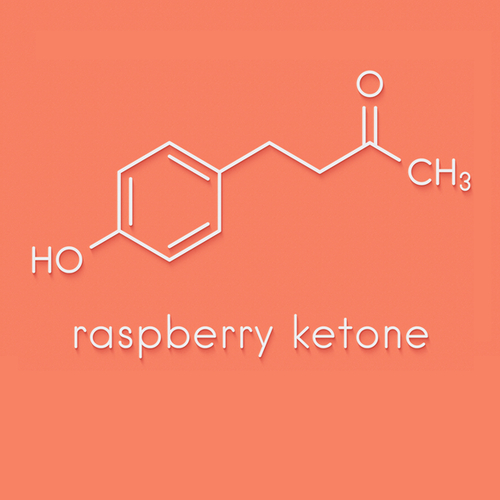Monographs licensed from Therapeutic Research Center, LLC
Scientific names: 4-(4-Hydroxyphenyl) butan-2-one
Alternate names: Cetona de Frambuesa, Cétone de Framboise, Frambinone, Raspberry Ketones, Red Raspberry Ketone, RK
Scientific names: 4-(4-Hydroxyphenyl) butan-2-one
Alternate names: Cetona de Frambuesa, Cétone de Framboise, Frambinone, Raspberry Ketones, Red Raspberry Ketone, RK
Raspberry ketone is a chemical that is found in red raspberries and other fruits. It's popular for obesity, but it's not clear if it helps.
It's believed that raspberry ketone might increase metabolism, increase how quickly the body burns fat, and reduce appetite. But evidence in humans is limited. Raspberry ketone is also found in kiwifruit, peaches, grapes, apples, other berries, rhubarb, and the bark of yew, maple, and pine trees.
People use raspberry ketone for obesity, hair loss, male pattern baldness, and other conditions, but there is no good scientific evidence to support these uses.
When taken by mouth: Raspberry ketone is commonly consumed in foods. When used as medicine, there isn't enough reliable information to know if raspberry ketone is safe. It is chemically related to a stimulant called synephrine, so it's possible that it might cause jitteriness, and increase blood pressure and heart rate.
Special Precautions & Warnings:
Pregnancy and breast-feeding: Raspberry ketone is commonly consumed in foods. But there isn't enough reliable information to know if raspberry ketone is safe to use as medicine when pregnant or breast-feeding. Stay on the safe side and avoid use.
Diabetes: Raspberry ketone might affect blood sugar levels. This might make it more difficult to control blood sugar in people taking medicines for diabetes.
There is interest in using raspberry ketone for a number of purposes, but there isn't enough reliable information to say whether it might be helpful.
There isn't enough reliable information to know what an appropriate dose of raspberry ketone might be. Keep in mind that natural products are not always necessarily safe and dosages can be important. Be sure to follow relevant directions on product labels and consult a healthcare professional before using.
Interactions with pharmaceuticals
Stimulant drugs
Interaction Rating=Moderate Be cautious with this combination.
Stimulants, such as amphetamines and cocaine, speed up the nervous system. By speeding up the nervous system, stimulant medications can increase blood pressure and speed up the heartbeat. Raspberry ketone might also speed up the nervous system. Taking raspberry ketone along with stimulant drugs might cause serious problems including increased heart rate and high blood pressure.
Warfarin (Coumadin)
Interaction Rating=Moderate Be cautious with this combination.
Warfarin is used to thin the blood and prevent blood clots. Raspberry ketone might reduce the effects of warfarin, which could increase the risk for blood clots. If you take warfarin, talk with your healthcare provider before taking raspberry ketone.
Interactions with herbs & supplements
Herbs and supplements with stimulant properties: Raspberry ketone might have stimulant effects. Taking it with other supplements with similar effects might increase the chance of side effects, including rapid heartbeat and high blood pressure. Examples of supplements with this effect include 1,3-DMAA, bitter orange, caffeine-containing products, DMHA, and ephedra.
There are no known interactions with foods.
vital.ly has licensed monographs from TRC Healthcare.
This monograph was last reviewed on 17/06/2024 10:00:00 and last updated on 08/03/2016 03:30:03. Monographs are reviewed and/or updated multiple times per month and at least once per year.
Natural Medicines disclaims any responsibility related to medical consequences of using any medical product. Effort is made to ensure that the information contained in this monograph is accurate at the time it was published. Consumers and medical professionals who consult this monograph are cautioned that any medical or product related decision is the sole responsibility of the consumer and/or the health care professional. A legal License Agreement sets limitations on downloading, storing, or printing content from this Database. No reproduction of this monograph or any content from this Database is permitted without written permission from the publisher. It is unlawful to download, store, or distribute content from this site.
Natural Medicines rates safety based on scientific evidence according to the following scale: Likely Safe, Possibly Safe, Possibly Unsafe, Likely Unsafe, Unsafe, and Insufficient Evidence to Rate. For more information about Natural Medicines’ Safety Rating System,
click here.
The Natural Medicines Effectiveness Ratings are assigned for specific indications. A product might be rated "Possibly Effective" for one condition, but be rated "Likely Ineffective" for another condition, depending on the evidence. For more info
click here.





